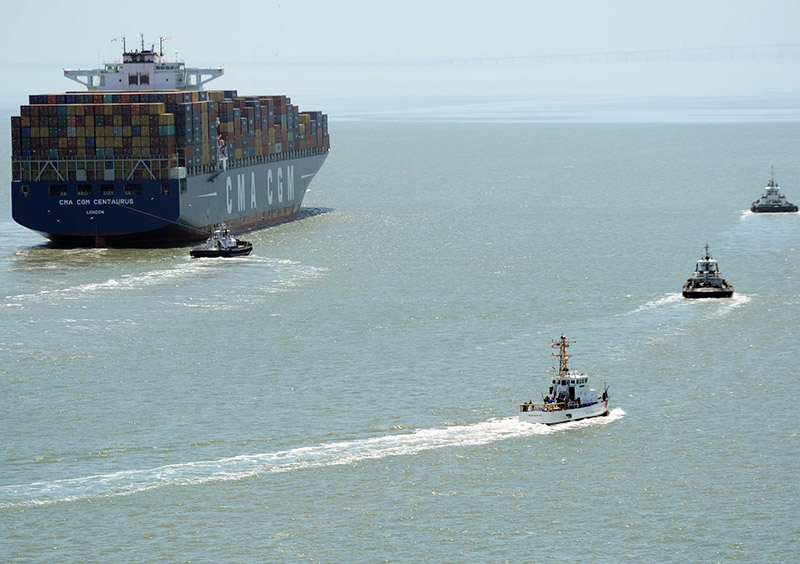Powerful foreign carrier alliances formed in response to the global shipping slowdown are threatening the domestic tugboat industry, according to the American Waterways Operators.
Tug companies providing harbor services could be put at a competitive disadvantage by alliances that attempt to collectively negotiate service contracts unless Congress acts to tighten up a 1916 shipping law, says the national advocacy group for the tug and barge industry.
At issue are changes in international shipping. As container lines struggle to stay afloat in a difficult market that has caused a drop in demand for their services, some carriers have gone bankrupt, while others have merged or entered into alliances in which companies share ships and port facilities to save money. The number of major shipping lines has dropped from 20 in 2015 to what will be 13 next year when three Japanese carriers consolidate, according to the Federal Maritime Commission (FMC).
Normally a container line contracts directly with U.S. operators that assist ships entering American ports or provide containerized barge services between U.S. ports for international cargoes. But newly formed shipping alliances are increasingly trying to go around these traditional business relationships by seeking a limited anti-trust exemption to U.S. shipping law that allows them to negotiate collectively with U.S. tug operators.
Over the past year, five foreign carrier alliances have applied for authority to negotiate jointly with U.S. service providers. In three of these cases, the petitioners withdrew their requests to the FMC, but in January the FMC granted a request from a group of roll-on/roll off carriers to negotiate with tug operators despite objections from the domestic industry.
The FMC concluded that allowing the carriers to negotiate collectively would not harm U.S. ports, importers or exporters.There was no mention of potential anti-competitive impacts on U.S. tugboats that provide harbor services, according to AWO.
In March, a group of Japanese ocean carriers filed a so-called Tripartite Agreement under the U.S. Shipping Act of 1984, which authorizes them to discuss, negotiate and implement contractual agreements with feeder, tugs, barge and inland carriers.
AWO is concerned that such requests will continue and worries that the FMC is not thoroughly vetting them and taking into account negative impacts on the U.S. industry, such as the potential for price fixing and collusion. According to the association, collective negotiations disadvantage U.S. tug companies because they lack authority to take joint action on their own.
“It is fundamentally unfair, anticompetitive and at odds with the interests of the U.S. maritime industry to skew the playing field in favor of massive international shipping conglomerates — which include foreign state-owned enterprises and entities that have paid criminal fines for anticompetitive behavior — at the expense of American tugboat companies and other domestic service providers,” Thomas Allegretti, AWO’s president and CEO, told a congressional subcommittee on Wednesday. He called it “an existential threat to the health and viability of the domestic harbor services industry.”
Allegretti said that if container companies share rate information for tugboat services, they can use their power in an alliance to drive down rates, and tug companies would have to accept “non compensatory rates” or incur loss of a big part of their business. “We should not allow this to happen,” he told the House Transportation and Infrastructure subcommittee on Coast Guard and Maritime Transportation.
AWO estimates that about 50 companies and some 500 vessels regularly engaged in ship assist and harbor services could be affected, but the impact could be much larger as there are many more vessels that are equipped to provide such services.
Congress held the hearing to discuss regulations on the maritime industry, but Allegretti focused his statement on these shipping alliances, saying the issue is of far greater concern to his members.
He asked Congress to intervene by amending the Shipping Act to remove the limited anti-trust immunity provision for foreign carriers if the FMC continues to permit joint negotiations. He said it should be made clear that carriers in alliances should continue to negotiate contracts individually with tug companies, and not be permitted to do so as one unit. Both Democrats and Republicans on the subcommittee agreed that the law should be reviewed.
“We need to modernize the law to acknowledge the (shipping) industry as it exists today,” Rep. John Garamendi, D-Calif., said. “We need to change the law to set up a balance to create competition and eliminate collusion.”
Rep. Duncan Hunter, R-Calif., subcommittee chair, said that the FMC’s prime concern seems to be keeping shipping rates low to benefit consumers, but “we need to take into consideration the maritime industry” as well.
The FMC says that carrier alliances can be beneficial for U.S. exporters, importers and consumers as efficiencies and cost-savings can be passed on to domestic consumers. Due to concerns that new alliances could give shipping lines more leverage in contract negotiations and dictate rates, the FMC says it is closely monitoring the market for unreasonable increases in costs and drops in services and is tightening the economic review process for new alliance agreements.
Michael Khouri, acting FMC chairman, said he wasn’t sure if Allegretti’s proposal “is a bad idea or not. I would want a reasoned input from all parties to see if there are unintended consequences.”





